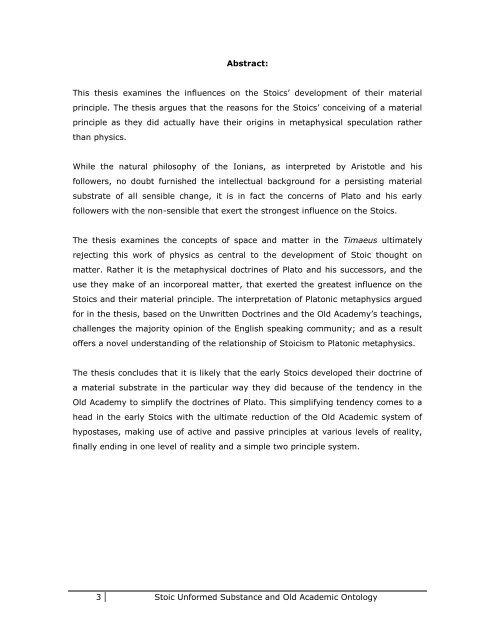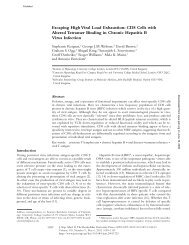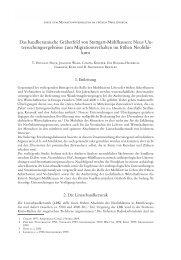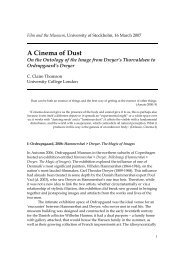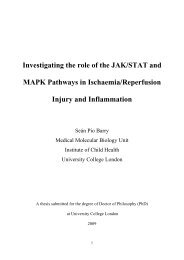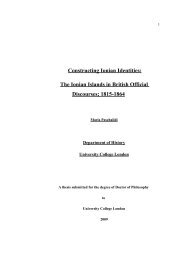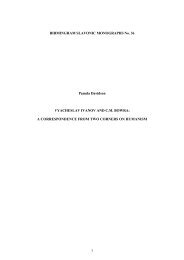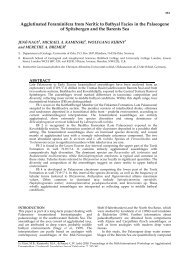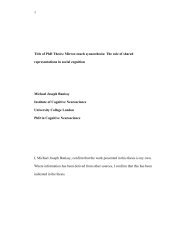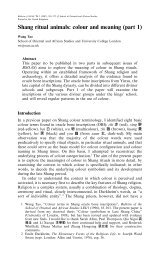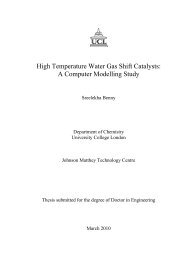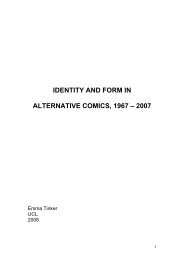- Page 1: Stoic Unformed Substance and Old Ac
- Page 5 and 6: Contents Introduction 7 Chapter One
- Page 7 and 8: Introduction: The purpose of this t
- Page 9 and 10: antiquity through to the time of Ga
- Page 11 and 12: Plato‟s direct, oral, teaching 24
- Page 13 and 14: I will be building on the work of S
- Page 15 and 16: passive, appears to resemble the te
- Page 17 and 18: Cleanthes than the innovations foun
- Page 19 and 20: transmutation means that at this st
- Page 21 and 22: proximate) as substance in Metaphys
- Page 23 and 24: main influence and method of unders
- Page 25 and 26: of bronze (e.g. the fact that it is
- Page 27 and 28: The Four elements that proximate ma
- Page 29 and 30: something to exist with no essentia
- Page 31 and 32: 1.2.1 The Stoic Apoios Ousia: This
- Page 33 and 34: eadth and depth; this is also calle
- Page 35 and 36: is of course true to say that the e
- Page 37 and 38: quality. But if so, then, first, qu
- Page 39 and 40: simple understanding of body when t
- Page 41 and 42: used mathematics to justify their u
- Page 43 and 44: common substrate they change with r
- Page 45 and 46: 1.2.2 Apoios Ousia and its Relation
- Page 47 and 48: The element par excellence is so ca
- Page 49 and 50: principle is a compound of matter a
- Page 51 and 52: does on a literal reading of the Ti
- Page 53 and 54:
Point 1 implies that pneuma can be
- Page 55 and 56:
This is borne out by Cicero‟s rep
- Page 57 and 58:
Chrysippus supposed. 159 ” Chrysi
- Page 59 and 60:
heat, building on the works of Parm
- Page 61 and 62:
sustain bodies and are responsible
- Page 63 and 64:
what sustains, and the material sub
- Page 65 and 66:
1.2.3 Blending Through and Through:
- Page 67 and 68:
type of blending and the one that c
- Page 69 and 70:
into it. This is indeed a very intu
- Page 71 and 72:
hexeis would merge and thus it woul
- Page 73 and 74:
independently existing bodies, but
- Page 75 and 76:
But since Chrysippus undoubtedly be
- Page 77 and 78:
of principles. They appeal to only
- Page 79 and 80:
this may have been understood by th
- Page 81 and 82:
interchangeability of the terms is
- Page 83 and 84:
shapes they make do not have this f
- Page 85 and 86:
Timaeus. The interpretation of Proc
- Page 87 and 88:
Plato then moves on to the particul
- Page 89 and 90:
existed in a disordered way prior t
- Page 91 and 92:
suggests space rather than matter i
- Page 93 and 94:
The point of this passage is not to
- Page 95 and 96:
2.1.3 Concluding Remarks About the
- Page 97 and 98:
Stoic look at the Timaeus in a more
- Page 99 and 100:
2.2 Aristotle and Matter: Speusippu
- Page 101 and 102:
for Aristotle, as for all ancient w
- Page 103 and 104:
The position of King and Charlton r
- Page 105 and 106:
generic intelligible matter which u
- Page 107 and 108:
Anima Hahm 296 is cautious in accep
- Page 109 and 110:
Chapter 3 3.1 Plato’s Late Ontolo
- Page 111 and 112:
elation to its model. The metaphysi
- Page 113 and 114:
indispensable for knowledge 305 ; y
- Page 115 and 116:
not have access to his conversation
- Page 117 and 118:
of all three is postulated by this
- Page 119 and 120:
The first number series, being the
- Page 121 and 122:
3.1.2 The Philebus The Parmenides i
- Page 123 and 124:
are not one but unlimited, second h
- Page 125 and 126:
The Philebus divides the things tha
- Page 127 and 128:
ensure that partake of the One as m
- Page 129 and 130:
we saw above, moves very quickly fr
- Page 131 and 132:
1) The unlimited still appears to b
- Page 133 and 134:
1. In his seventh letter Plato hims
- Page 135 and 136:
or limiting factor on some sort of
- Page 137 and 138:
It is this fact and Aristotle‟s m
- Page 139 and 140:
3.2.1 The Written and Unwritten Doc
- Page 141 and 142:
imposition of form by the One 1 . T
- Page 143 and 144:
as the Great and Small, we were tol
- Page 145 and 146:
3.3 The Old Academy The preceding s
- Page 147 and 148:
are then ordered according to the T
- Page 149 and 150:
3.3.1 Formal Level: Plato had, quit
- Page 151 and 152:
far as a first principle goes this
- Page 153 and 154:
most clearly of all the Platonists,
- Page 155 and 156:
We know that Speusippus had a keen
- Page 157 and 158:
are not. Thus the same result will
- Page 159 and 160:
and so on down to the substance of
- Page 161 and 162:
the tetraktys which contain the dec
- Page 163 and 164:
These thinkers, then, generate magn
- Page 165 and 166:
some sort of order. In theory the b
- Page 167 and 168:
The tetraktys is, as Dillon points
- Page 169 and 170:
In explaining the Pythagorean doctr
- Page 171 and 172:
3.4 The Stoics: Xenocrates is the l
- Page 173 and 174:
The division of bodies goes on infi
- Page 175 and 176:
understand them. It seems plausible
- Page 177 and 178:
elaborated by Chrysippus into a the
- Page 179 and 180:
eason to suppose that Polemo in par
- Page 181 and 182:
But they hold that underlying all t
- Page 183 and 184:
applies to the two principles as th
- Page 185 and 186:
4.1.1 Heraclitus: Heraclitus‟ pla
- Page 187 and 188:
The evidence for the Early Stoics
- Page 189 and 190:
the infinite occurrences of his lif
- Page 191 and 192:
“turnings of fire: first, sea; an
- Page 193 and 194:
philosophy which there is no reason
- Page 195 and 196:
Heraclitus says: “the thunderbolt
- Page 197 and 198:
ecome earth: out of earth comes wat
- Page 199 and 200:
4.2 Biology and the Mythic Account:
- Page 201 and 202:
case that god is turning parts of t
- Page 203 and 204:
principle I will look at just two p
- Page 205 and 206:
concerned, is known by the poets; w
- Page 207 and 208:
as a passive element. This also rel
- Page 209 and 210:
general influence of the pre-Socrat
- Page 211 and 212:
as it will resemble its father more
- Page 213 and 214:
which exist at the microscopic as w
- Page 215 and 216:
physics. However the major influenc
- Page 217 and 218:
the mathematical level also “over
- Page 219 and 220:
Academy, and that Chrysippus respon
- Page 221 and 222:
Barnes. J. The Pre-Socratic Philoso
- Page 223 and 224:
Dampier. W.C. A History of Science
- Page 225 and 226:
Gould. J.B. The Philosophy of Chrys
- Page 227 and 228:
- Plato and the Foundation of Metap
- Page 229 and 230:
Pearson. A.C. The Fragments of Zeno
- Page 231 and 232:
- Theophrastus of Eresus: Sources f
- Page 233:
List of Abbreviations: DCMS Iamblic


